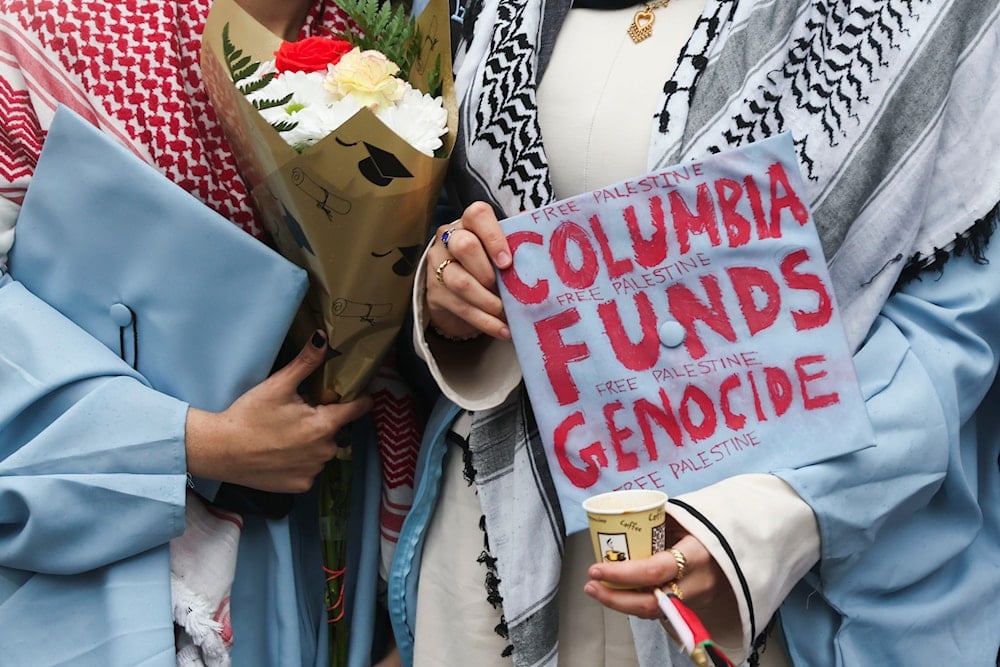Columbia reaches $220M deal with US government over campus protests
Columbia University will pay over $220M in a settlement with the Trump administration amid scrutiny over pro-Palestine campus protests.
-

A graduate shows off their decorated cap in support of Palestinians while posing for photos across the street from the main gates of Columbia University, Wednesday, May 21, 2025, in New York. (AP Photo/Heather Khalifa)
Columbia University has agreed to pay over $200 million in a settlement with the Trump administration, concluding months of tension over the university's handling of campus protests and antisemitism-related allegations.
Under the terms of the deal, Columbia will pay $200 million over three years to the federal government and an additional $21 million to settle claims brought by the US Equal Employment Opportunity Commission. The agreement also mandates the adoption of institutional reforms, including revisions to the student disciplinary process and the adoption of the controversial International Holocaust Remembrance Alliance (IHRA) definition of antisemitism.
In exchange, the Trump administration will reinstate $400 million in federal funding that had been previously frozen, including critical research grants. Columbia was also facing the threat of losing up to $1.2 billion more in funding from agencies such as the National Institutes of Health.
The settlement follows Columbia's disciplinary actions against almost 80 students involved in a high-profile campus protest in May 2025 against the war on Gaza. Critics argue the university bowed to federal pressure, compromising its academic independence and values.
Columbia's agreement includes the appointment of an independent monitor who will report biannually to the federal government on the university's compliance with the settlement terms.
Broader federal crackdown on universities
The Trump administration has increasingly focused on elite academic institutions, accusing them of fostering antisemitic environments and failing to align with US foreign policy priorities. This strategy has involved the suspension of federal grants worth billions and exhaustive demands for policy changes.
In addition to Columbia, the administration has threatened or imposed funding freezes on Cornell University ($1B), Northwestern University ($790M), Brown University ($510M), and Princeton University. The University of Pennsylvania saw $175 million in research support withdrawn before implementing policy revisions on protest management and transgender athlete participation.
Harvard University has emerged as the most prominent institution resisting the administration's efforts. In April 2025, the Trump administration froze over $2.2 billion in federal research grants and contracts after Harvard refused to comply with a list of demands, which included dismantling diversity, equity, and inclusion (DEI) programs, restructuring university governance, implementing viewpoint diversity audits, and overhauling protest regulations.
The administration also targeted Harvard's international student programs. The Department of Homeland Security blocked new international student enrollments and demanded the removal of all F-1 and J-1 visa holders for the 2025–2026 academic year. Simultaneously, the State Department opened an investigation into Harvard's eligibility to sponsor exchange visitors.
In response, Harvard filed a lawsuit arguing that the administration's actions violated the university's constitutional rights. Federal Judge Allison Burroughs issued preliminary rulings favoring Harvard, allowing existing international students to remain temporarily. The case is ongoing, with more than $2.6 billion in funding and the university's operational independence at stake.
The wave of federal action came after a series of pro-Palestine protests that swept across US campuses in late 2023 and 2024 following the war on Gaza, and critics have argued that the government's response to the demonstrations aims to suppress legitimate protest and dissent.

 3 Min Read
3 Min Read










